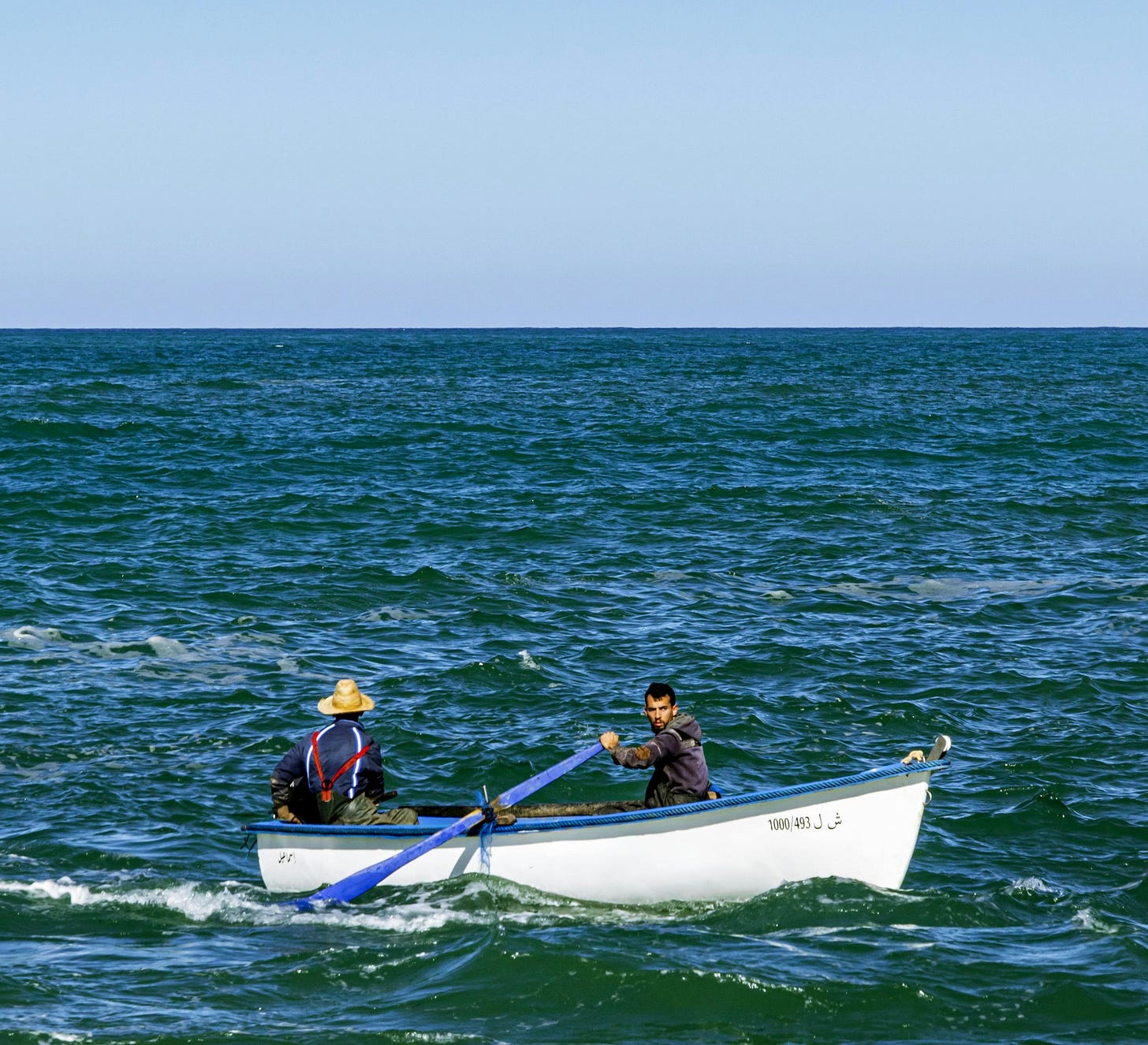Navigating the Storms of Spiritual Life
Why our trials are not a curse but a catalyst for wisdom and compassion
Dear friend,
Welcome to another edition of Beyond Self Improvement! If you missed it, here’s last week’s article: The Self Improvement Paradox: Why Achieving More Can Make You Feel Less.
In today’s essay, you’ll learn how the conditions of your life are not arbitrary obstacles but essential elements of your spiritual growth, helping you nurture wisdom and deepen compassion. If you’re new, consider subscribing below to join our growing community and get the next essay direct to your inbox:
In 1963, a woman sat in the stillness of a small room, surrounded by the echo of her complicated past. Maya Angelou had already navigated a life of challenges that would seem impossible to many. From the early years of racial discrimination and sexual abuse to the challenges of raising a child as a single mother, Angelou's path was marked by a series of struggles against the cultural currents of the time.
Yet, it was in the depths of despair and dismissal that Angelou found her voice. As a poet, memoirist, and civil rights activist, she shared a story that would resonate with millions. Her seminal work, "I Know Why the Caged Bird Sings," brought her narrative to the public and illuminated the silent sufferings of countless others.
Halfway through the decade, Angelou realized the power of her past to inspire change. While deeply personal, her experiences were universally relatable. She transformed her trials into literary alchemy, using her past not as a chain but as a source of inspiration and strength.
Angelou's approach to writing and speaking about her difficulties marked a new paradigm in literature and activism. Once stifled by the weight of her past, her voice became her most resonant resource, ringing through the halls of humanity.
𑁍
It’s easy to be happy when life is calm but challenging when life is turbulent. And yet, life is rarely smooth. It more resembles a zig-zagging stock market than a straight line.
That’s where spirituality comes in—it helps us dance with life’s difficulties and smooth out the ups and downs. At the same time, when life is stormy, our spiritual practices don’t always protect us. At times, we may even wonder why we practice at all.
Believing that spiritual practice should consist solely of ease and happiness is naive.
Expecting a mix of joy and sadness, comfort and challenge is more accurate. If the practice is about embracing the full spectrum of our lives, it will naturally include moments of crisis, loss, or difficult self-reflection. Ideally, we'd navigate these periods easily, gracefully, and wisely. Being overly critical of ourselves during such times only increases our distress and hinders the development of compassion.
Judging our spiritual practice by the presence of happiness and ease is shortsighted and doesn’t account for the breadth of personal traits that must be nurtured.
To illustrate, I’d like to share a story from the book The Issue at Hand by one of my teachers, Gil Fronsdal. Imagine two individuals setting off across a big lake, each in a small rowboat. The first leaves on a day when the lake is smooth, with a light breeze and a steady current pushing them along. Each stroke propels the boat swiftly across the water. Rowing is easy and pleasant. They quickly reach the other shore and may admire themselves for their skill.
The second ventures across the same lake during a storm. They face stiff winds, currents, and waves. The boat moves slightly with each stroke, but much gain is lost when lifting the oars for the next stroke. Despite the struggle, eventually, they reach the other side of the lake. They may feel disheartened about their rowing ability.
Most of us would like to be the first rower. Yet the second rower has gained strength from the struggle and is better prepared for future challenges.
𑁍
Some meditators feel good about their ability to meditate when practice is easy. Others are consumed with doubt and self-criticism when practice is stormy.
Our best efforts during adversity may not be enjoyable. But they could offer something more profound: cultivating inner qualities that sustain spiritual life over time, such as mindfulness, perseverance, bravery, empathy, humility, renunciation, discipline, focus, faith, acceptance, and benevolence.
Awareness of intention is one of the most helpful spiritual skills.
Our intention is like a muscle—the more we follow through on it (to be mindful and compassionate), especially during difficult times, the stronger it becomes. Our effort is beneficial, even when it feels awkward or fails to achieve a specific goal, particularly when we come from a place of trust. Our confidence grows as our core motivations strengthen, providing sanctuary under challenging times.
Meditators often appraise their practice by their meditative experiences. Yet regular practice is less about our meditative experiences and more about cultivating our inner abilities and strengths. This includes awareness and investigation in any situation, serene or stormy.
Mindfulness and constancy help us develop inner strengths, such as calm and joy and staying awake and free in the face of pain and pleasure.
𑁍
It wasn’t until I heard Eckart Tolle utter these words that I understood this truth: “The conditions of your life are not here to please you but to challenge you, to frustrate you, and to wake you up.” It was one of those “Oh, crap” moments where I realized my approach to life was all wrong. I expected and desperately wanted life to be easy and to go my way, at least most of the time. How naive I was.
In ordinary language, a crucible is a vessel in which different ingredients are melted together in extreme heat to create a new form. Symbolically, it represents the severe tests we endure in life.
James Frey articulates this concept beautifully, referring to it as "the container that holds the characters together as things heat up." Much like a narrative crucible, our lives are endless challenges: The Odd Couple dynamics of roommates, bandmates with differing creative instincts, and intimate relationships with differing values and priorities.
These challenges are the essence of our existence rather than obstacles to overcome. They bind us to our path, making escaping less appealing than fighting. This relentless push and pull shape us and mold us into beings of resilience and depth.
Characters caught in a crucible won’t declare a truce and quit—they’re in it until the end.
The key to the crucible is that the characters' motivation to continue opposing each other is greater than their motivation to run away. The crucible is an emotional or physical environment that bonds people. It is a relationship. The essence of a crucible is that the characters are drawn more to it than to escaping from it. Sounds familiar.
𑁍
Looking back on my life, I see that the most painful times strangely feel like the best. The ending of relationships and the loss of jobs and money were simultaneously the beginning of something new.
Consider your own life. The loneliness of moving from one town to another, the sting of being chosen last in physical education, or the crippling weight of injury or chronic pain. These experiences, as disheartening as they might seem, are the very instances that mold our temperament.
The experiences of suicidal depression, the mountain of debt, the pain of academic or professional failure, and the heartache of lost love or financial ruin—each of these episodes is a thread in the complex fabric of our lives. Within this fabric lies a stark truth: we experience the most profound growth during our most painful times.
The analogy of rowing against the wind beautifully captures the essence of our struggle. While it might seem that we're barely moving, each stroke of the oar into the wind strengthens our resolve and helps us know ourselves better. We are not merely traversing a body of water but learning to navigate life's uncertain seas.
In this relentless pursuit, remember Jim Rohn’s words: “Don't wish it was easier wish you were better. Don't wish for less problems wish for more skills. Don't wish for less challenge wish for more wisdom.” And as Kamal Ravikant says, "Real growth comes through intense, difficult, and challenging situations.”
𑁍
May Maya Angelou’s example help you see that the conditions of your life are not arbitrary obstacles but essential elements of your growth. They challenge and frustrate you and, ultimately, wake you up to the vast reservoirs of strength and potential within.
So, as you face each day, remember that the path is not about avoiding the storm but learning to row in the wind. It's about embracing the struggle, facing the waves head-on, and emerging from the storm intact, wiser and more compassionate.
In the end, it's the challenging winds, not the calm seas, that shape the finest sailors.
Keep rowing,
Ryan
Whenever you’re ready, I can help you transform chronic anxiety and overwhelm into ongoing peace—making you feel calm and in control of your life. Schedule a free, 30-minute clarity call now.




Exactly what I needed right now! Thanks, Ryan!
Amazing read Ryan, thank you.